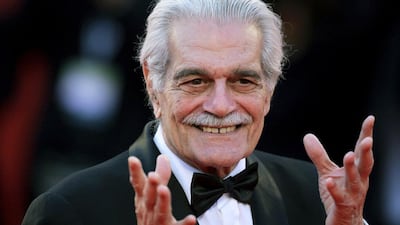Egyptian actor Omar Sharif, who died on Friday at the age of 83, was perhaps one of the best known, and most mercurial, figures in Arab cinema – yet his portfolio consisted of almost entirely non-Arab roles.
The news is a double blow to the regional film industry: Sharif’s death comes six months after the death of his former wife and fellow Egyptian screen legend Faten Hamama in January.
Born Michel Demitri Shalhoub in the Mediterranean city of Alexandria – at the time a cosmopolitan hub – to parents of Syrian and Lebanese extraction, Sharif was raised a Catholic. He studied at Alexandria’s Victoria College before gaining a degree in mathematics and physics from Cairo University.
He joined his father's lumber business, but the acting bug had taken hold while he was studying and, in 1954, he made his silver screen debut in the Egyptian film Siraa Fil-Wadi (The Blazing Sun) by Youssef Chahine. The movie's romantic intrigue was echoed off-screen when he married his leading lady, renowned Egyptian actress Hamama, converted to Islam and took the name Omar Sharif – he referred to Hamama as the love of his life.
They had one son, Tarek, before divorcing in 1974.
He shot to fame playing Sharif Ali in David Lean's critically acclaimed and multi Oscar-winning Lawrence of Arabia in 1962, but he was already big news in the Middle East, having appeared in numerous Egyptian films.
It was Lean's movie that put him on the international stage, however. Sharif later came to despise the film, describing it as nothing more than shots of camels walking from one side of the screen to the other. He was still happy enough to reunite with Lean the following year to play the eponymous lead in another classic, Doctor Zhivago. The film added a further five Academy Awards to the seven picked up by Lawrence of Arabia. Unlike that film, however, Sharif wasn't on the honours list this time around, despite the fact that the American Film Institute rates it as the 39th greatest American film of all time.
Intriguingly, Sharif found himself playing a Russian in Doctor Zhivago. Having diverged from his Arab debut on global screens in Lawrence, the next couple of years went on to see him play a Spanish priest in Behold a Pale Horse (1964), a Yugoslav wartime patriot in The Yellow Rolls-Royce (1964), and the eponymous Mongolian conqueror in Genghis Khan (1965). He returned to Egypt in the 1980s and starred in a number of films, and went back to Egypt again at the start of the millennium.
In his later life, Sharif picked up a César Award for Best Actor in 2003's Monsieur Ibrahim, the French-language film adaptation of the novel Monsieur Ibrahim et les fleurs du Coran (Sharif spoke Arabic, English, French, Greek, Italian and Spanish fluently) he portrayed a Muslim Turkish merchant who becomes a father figure to a Jewish boy.
He also became well-known for slightly diva-ish outbursts in his later years. In 2003, Sharif was given a one-month suspended prison sentence and a €1,500 (Dh8,548) fine for headbutting a policeman in a Paris casino. In 2005 he was ordered to attend anger management classes and served two years probation after assaulting a Beverly Hills parking valet. He was also caught on video in 2011, apparently hitting a journalist who attempted to take a photo with him at the Doha Tribeca Film Festival.
Sharif's most recent film was 2013's Rock the Casbah, which also starred regional festival perennial Nadine Labaki and premièred as a special presentation at 2013's Toronto Film Festival. The short animation 1001 Inventions and the World of Ibn Al-Haytham, which Sharif voiced, is yet to be released.
Reports of his declining health began earlier this year, with his son Tarek confirming to a Spanish newspaper that his father had been battling Alzheime’rs for the past three years. He died in Cairo of a heart attack, his agent Steve Kenis said in London.
Close friend and former antiquities minister Zahi Hawwas said Sharif died in an upmarket Cairo clinic where he had been under treatment for the past month.
“His psychological state had deteriorated, he wasn’t eating or drinking,” said Hawwas.
Before the anticipated flow of tributes from across the globe, renowned Egyptian actress Youssra expressed her personal grief: “I feel awful, I just lost [one] of the best people in my life, I feel so lost and unhappy and helpless,” she said.
The culture minister said Egypt had suffered “an immense loss”, while grandson Omar Sharif Jr tweeted: “I join my family in thanking everyone for the global outpouring of prayers & support we’ve been receiving. I will miss my grandfather dearly.”
Additional files from AP

